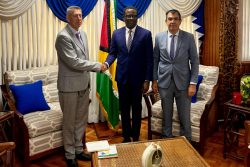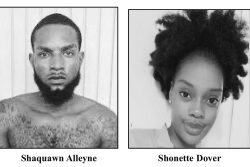Some Caricom Heads including President Irfaan Ali did not recognise that the war in Ukraine had global implications which went well beyond what they perceived to be their national interest in economic or localised political terms. Aside from the moral principle involved and in Guyana’s case, the importance of sanctioning states which violate the territorial integrity of another, there is an additional factor which distinguishes this conflict from Syria or Yemen or Iraq or Afghanistan, whose populations have also endured terrible suffering partly or wholly on account of the actions of other states. This time it is different because nuclear powers are involved, if only in a proxy sense.
Nato countries, while supplying some forms of sophisticated weaponry to Ukraine, are going to considerable trouble to avoid becoming active participants in the conflict. They have refused to declare a no-fly zone, for example, or supply aircraft to Kyiv, but that notwithstanding, experts in the military field have suggested various avenues by which the war could escalate. No one knows, for example, where Nato’s red lines are drawn in relation to Ukraine, let alone what the erratic and unreadable President Putin is prepared to do. A direct confrontation between nuclear powers threatens everyone, no matter how insignificant they are as players in the international scheme of things.
If Caricom was divided with one half including Guyana being incapable of grasping the big picture and seeing that it was necessary to try and isolate Russia globally by voting against it whenever the opportunity arose, it was not the only issue where disunity showed itself. The body was simultaneously also confronting a more pedestrian and typical split in the ranks in relation to the matter of an appointment.
While this concern does not have the existential quality of the Ukraine problem, it is important nonetheless considering that it relates to the choice of a Secretary-General of the Commonwealth. The present incumbent is Baroness Patricia Scotland, who is up for re-election in June at a Commonwealth Heads of Government Meeting in Kigali, Rwanda, after her term was considerably extended owing to the Covid pandemic. The expectation is that a secretary-general will be re-elected once they have served their first four-year term; they are not allowed to serve more than two.
When the Caricom Heads met in March it was declared a consensus had been reached that the Community would give its support to Baroness Scotland for re-election. But then shortly after that on April 1 Jamaica took everyone aback when that country’s Foreign Minister, Kamina Johnson-Smith, announced she was challenging Scotland for the post. Antigua’s Prime Minister Gaston Browne described this as a “monumental error.”
The convention is that each Commonwealth region – Africa, Asia, the Pacific and the Caribbean – takes its turn in rotation to provide a secretary-general. The current occupant represents the Caribbean, and if she is re-elected it would be Africa’s turn in 2024, followed by the Pacific. Not to support the Baroness, said Mr Browne, would run counter to the principle of rotation, and would encourage the other regions to present their own candidates.
As such, Jamaica’s tactics might only serve “as a gateway for a non-Caricom secretary general to succeed”. The Caribbean prior to this had not had a secretary-general since Sir Shridath Ramphal, who filled the post up to 1990.
The seeds of the current Caricom discord on the matter of appointing a Commonwealth secretary-general have their origins in what happened the last time around in 2015. On that occasion there was no doubt that it was the Caribbean’s turn to supply a candidate for the post, but the members of Caricom could not agree on anyone. The three names in contention were those of Baroness Scotland, Sir Ronald Sanders and Senator Bhoe Tewari. Where Baroness Scotland was concerned, although she had been born in Dominica, she had left the island when she was only two years old, and had spent her life in the UK, where among other political posts she served as Attorney General under the last Labour government. She was supported by Barbados and Belize, but was not favoured by the other territories because she was seen in reality as Britain’s candidate for the position who had not done enough to support the region when in government in the UK. In addition, she had backed the Iraq invasion.
Sir Ronald Sanders is Guyanese born, but was nominated by Prime Minister Browne of Antigua supported by seven of the other Caricom states. He was certainly very well known across the Caribbean, but there were some territories which were implacably opposed to his candidacy, and that divide was never bridged. Trinidadian Senator Bhoe Tewari was not well known in the region, and was not thought to have the requisite experience. He retired from contention fairly early on in the proceedings.
Given the impasse over the two leading contenders, one might have thought that a third nominee would have been put forward in the form of a well-known statesman of acknowledged experience as an alternative, but that never happened. In the end, Sir Ronald Sanders withdrew from the race, leaving Baroness Scotland the winner by default. Although she was the candidate which the UK initially wanted, they were to pay a price for their manoeuvrings to get her into office.
Having played a part in securing her election, the Foreign Office then wanted her removed on the grounds of her alleged misuse of funds. She was reported as having been criticised by the internal auditors in relation to a lucrative consultancy contract as well as other alleged failings which “endangered the integrity” of the Secretariat. In addition, it was claimed that procurement rules had been waived by the Secretariat on 50 occasions in three years. As a consequence, the UK, Australia and New Zealand had suspended funding of the Secretariat’s “financial procedures”. Baroness Scotland has denied financial improprieties.
Britain had made its first public move to replace the Baroness last year by supporting Kenyan Energy Minister Monica Juma for the post. However, she later withdrew and although she had the endorsement of the African Union, it seems she could not command enough support across the Commonwealth at large. Former Jamaica Foreign Minister Delano Franklyn was quoted as saying: “As chairman of the Commonwealth, Prime Minister Boris Johnson is doing everything to ensure that he has a secretary general of the Commonwealth who will fall in line with the thinking of British conservative politics.” He suggested the royal visit to Jamaica was used as a backchannel to lobby the government there. Britain, of course, insists that it is neutral.
Whatever the case, given the financial allegations, it appears on the face of things that Baroness Scotland might not be able to secure a consensus at the larger Commonwealth level, something that is usually aimed for.
As for Caricom and the problem of discord within its ranks, it has been reported that agreement has been reached for a Caricom sub-group to interview the two candidates to see if a consensus can be reached. The members of this sub-group are The Bahamas, Belize, Dominica, Guyana, St Vincent and the Grenadines and Jamaica. It will be interesting to discover whether politics or alleged financial irregularity will dictate their response.







